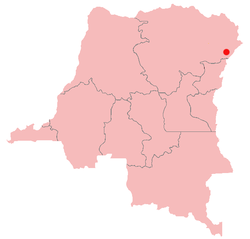Observations
The Security Council was determined to promote the Congolese peace process, including the establishment of an inclusive transitional government. There was concern at fighting in the Ituri region in the east of the Democratic Republic of the Congo and the humanitarian situation in the town of Bunia. Furthermore, there was an urgent need for a secure base to allow the interim administration in Ituri to function.
The preamble of the resolution also praised the United Nations Mission in the Democratic Republic of Congo (MONUC) for its efforts to stabilise the situation in Bunia and Ituri, particularly the performance of the Uruguayan contingent (soon to be joined by a Bangladeshi force). It deplored attacks on MONUC and the resulting loss of life. Determining the situation to be a threat to international peace and security in the region, [5] the Council considered requests from the Democratic Republic of the Congo, Ituri parties, Rwanda and Uganda to deploy a multinational force in Bunia.
Acts
Acting under Chapter VII of the United Nations Charter, the Council authorised the deployment of a temporary multinational force in Bunia to work in close co-ordination with MONUC until 1 September 2003. [6] It was mandated to assist the MONUC contingent already in Bunia; stabilise the security situation; improve the humanitarian situation; protect Bunia Airport and internally displaced persons; and contribute to the protection of the civilian population, United Nations and humanitarian personnel. [7] It stressed the temporary nature of the force in order to allow MONUC's presence to be reinforced in Bunia by mid-August 2003. All states participating in the force were authorised to use all necessary measures to fulfil its mandate.
The international community was called upon to contribute to the multinational force through the provision of personnel, equipment, logistical and financial support. The resolution demanded that the parties to the conflict in the Ituri region immediately end hostilities and strongly condemned deliberate killings of MONUC and humanitarian personnel, reiterating the need for respect of international humanitarian law. Furthermore, the Council demanded that all Congolese parties and states in the Great Lakes region respect human rights, end support for armed groups and militias, and co-operate with the international force and MONUC in Bunia.
